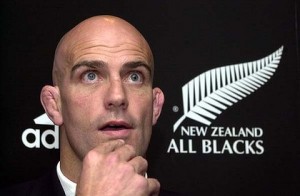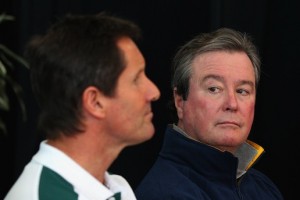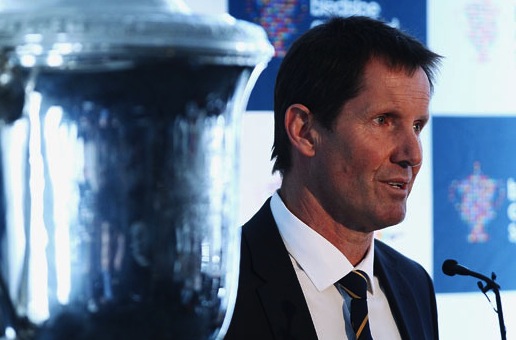At the time of writing, John O’Neill has fallen on his sword. Nobody in their right mind believes he has resigned because of other business interests. He has resigned because he put his fate in the hands of a fellow he chose who was never cut out for the job.
Is Deans’ demise imminent? Well after the effort against the Pumas, some people are optimistic about his chances. With O’Neill capitulating however, he no longer has any protection. Should the All Blacks stove Australia next week; I will be very surprised to see Deans on the end of year tour.
Before I begin let us look at the positives, Deans has helped Australia’s rankings since his arrival. Australia, were placed fifth in the World come the end of 2007. Since his time he has brought them back up to second. He has been the Wallabies most successful coach against the Bok’s and he has if somewhat erratically, increased Australia’s experience and playing depth.
In doing thus, he has given the chance to some precocious backline talents like Ioane, O’Connor and Beal. In the forwards, Sitaleki Timani looks the money as a second rower/utility flanker and Australia has two dynamic loose forwards David Pocock and Michael Hooper who will trouble international teams for years to come.
Nonetheless, since his appointment to coach the Wallabies in 2007, Deans reign has been a controversial one. Sure, he had a great record with the Crusaders however, it is widely understood in New Zealand that Wayne Smith, set up all the structures that would greatly help his later Super rugby successes.

Deans, as attendant to coach John Mitchell took over from Smith as All Blacks coach in 2001. They brought in a host of young talent and moved on older experienced heads. During their two years in charge, the two enjoyed some stunning successes. Yet, in un-leashing their All Blacks, had them peak too early and their set piece and back line moves exposed. They also grew arrogant and relied on the mercurial but inconsistent Carlos Spencer for their play making. To his credit, Deans famously warned the egotistical Spencer not to throw any cut out passes (which Spencer promptly refused to listen to).
Nonetheless, one swallow does not a summer make. Mitchell and Deans had divided the team well before Stirling Mortlock put us out of our misery as explained by Joseph Romanos. The Kiwi press who disliked the Mitchell and Deans operation had a field day and the headlines were deeply critical. One in particular may sound familiar to Wallabies fans.
“No passion, no pride, no brains, no leadership, wrong tactics, wrong options. Bloody gutted!”
The Taranaki Daily News
After the 2003 debacle, Mitchell was kicked into touch, but his assistant Dingo lived another day, at least in the eyes of his Canterbury faithful for whom he could do no wrong. Deans would go on to win 5 Super Rugby titles and be the word on many peoples lips as the heir apparent to Henry as the next All Black coach after the 2007 RWC tournament. Deans was apparently mystified and angered as to why he did not get the All Black call up. One person however, who saw a bargain was John O’Neill of the ARU.
In his haste to reclaim former glories, O’Neill in his woefully poor second stint as head of the organisation seemed to have overlooked the key traits of the coaches and players required to recreate them. Instead of examining the cold hard issues behind the Wallabies descent into mediocrity, O’Neill from the moment he hired Deans seemed content to market, not mould the Wallabies brand into world champion status.
O’Neill is not popular in Kiwi rugby circles, while I do think he was correct to take RWC games off New Zealand in 2003, his appointment of Deans smacked of some silly one up man ship with the NZRFU and his refusal to vote for New Zealand hosting the 2011 tournament came across as petty.

The ARU under O’Neill has also forgotten the most successful Australian rugby players have been ones that avoided too much limelight and down played their public image earlier on – David Pocock and Mike Hooper are but two good recent examples.
Thus, the hype behind the Wallabies leading into the last RWC was simply ridiculous. O’Neill should have learned from the Kiwi experience. That being, winning a Super Rugby title and a Championship trophy in World Cup year is no guarantee of success. Further that, for a relatively youthful team to do well at a World Cup like the All Blacks of 95 and the Wallabies of 99, the young players needed to have mature attitudes and a core of older experienced leaders both on and off the pitch.
Deans, in trying to make the All Blacks and Wallabies successful, has developed a bad habit of ditching under-performing (or not) star players, only to replace them with up and coming players often out of their depth, or failing that, individuals proven to have far less ability than the high profile players he has ditched.
I do not buy into the idea that injuries have been the problem either. A team can keep its shape and culture when under duress. In many ways, the injuries have been a blessing – were it not for them a number of players would never have seen day light. In so doing, Deans has undermined core leadership within the team dynamic.
That John O’Neill chose to ignore these issues when he hired Deans is bizarre. As we shall see in Part II, there were plenty of warning signs for the ARU and O’Neill concerning Deans ability as a coach.

